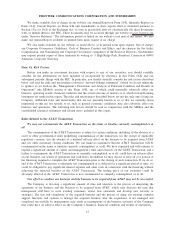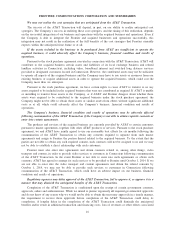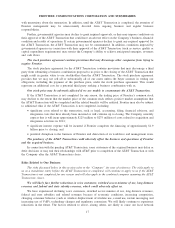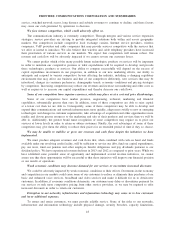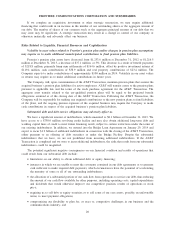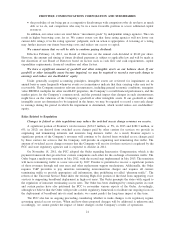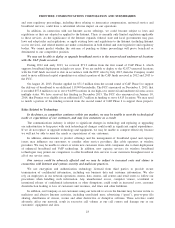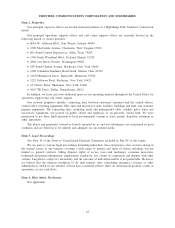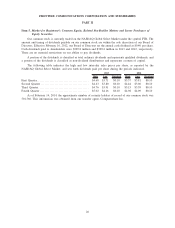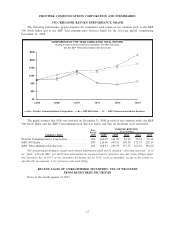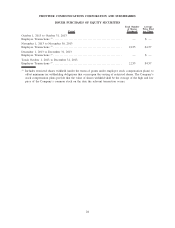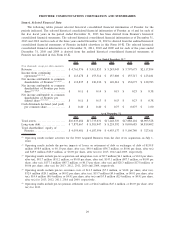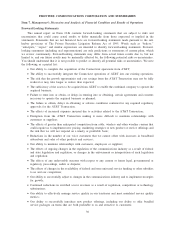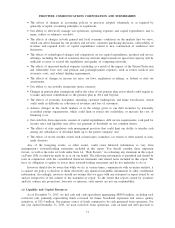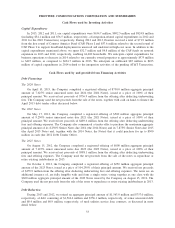Frontier Communications 2013 Annual Report Download - page 24
Download and view the complete annual report
Please find page 24 of the 2013 Frontier Communications annual report below. You can navigate through the pages in the report by either clicking on the pages listed below, or by using the keyword search tool below to find specific information within the annual report.and state regulatory proceedings, including those relating to intercarrier compensation, universal service and
broadband services, could have a substantial adverse impact on our operations.
In addition, in connection with our Internet access offerings, we could become subject to laws and
regulations as they are adopted or applied to the Internet. There is currently only limited regulation applicable
to these services. As the significance of the Internet expands, federal, state and local governments may pass
laws and adopt rules and regulations, or apply existing laws and regulations to the Internet (including Internet
access services), and related matters are under consideration in both federal and state legislative and regulatory
bodies. We cannot predict whether the outcome of pending or future proceedings will prove beneficial or
detrimental to our competitive position.
We may not be able to deploy or upgrade broadband service to the unserved and underserved locations
with the CAF funds received.
During 2012 and early 2013, we received $71.9 million from the first round of CAF Phase I, which
supports broadband deployment in high-cost areas. If we are unable to deploy to the 92,877 unserved locations
with the CAF funds received to date in accordance with the FCC rules by July 2015, then the Company would
need to incur additional capital expenditures or refund a portion of the CAF funds received in 2012 and 2013 to
the FCC.
On August 20, 2013, Frontier applied for $71.5 million from the second round of CAF Phase I to support
the delivery of broadband to an additional 119,000 households. The FCC announced on December 5, 2013, that
it awarded $57.6 million to us to serve 94,899 locations in our high-cost, unserved and underserved areas across
multiple states. We have received this funding in December 2013. The FCC also announced on January 10,
2014, that Frontier was eligible for an additional $3.7 million in funding to serve 6,815 locations. We may need
to match a portion of the funding received from the second round of CAF Phase I to support these projects.
Risks Related to Technology
In the future, as competition continues within our markets, we may be unable to meet the technological
needs or expectations of our customers, and may lose customers as a result.
The communications industry is subject to significant changes in technology and replacing or upgrading
our infrastructure to keep pace with such technological changes could result in significant capital expenditures.
If we do not replace or upgrade technology and equipment, we may be unable to compete effectively because
we will not be able to meet the needs or expectations of our customers.
In addition, enhancements to product offerings and the management of broadband speed and capacity
issues may influence our customers to consider other service providers, like cable operators or wireless
providers. We may be unable to attract or retain new customers from cable companies due to their deployment
of enhanced broadband and VoIP technology. In addition, new capacity services for wireless broadband
technologies may permit our competitors to offer broadband data services to our customers throughout most or
all of our service areas.
Our services could be adversely affected and we may be subject to increased costs and claims in
connection with Internet and systems security and malicious practices.
We use encryption and authentication technology licensed from third parties to provide secure
transmission of confidential information, including our business data and customer information. We also
rely on employees in our network operations centers, data centers, call centers and retail stores to follow our
procedures when handling such information. Any unauthorized access, computer viruses, accidental or
intentional release of confidential information or other disruptions could result in increased costs, customer
dissatisfaction leading to loss of customers and revenues, and fines and other liabilities.
In addition, our Company or our customers using our network to access the Internet may become victim to
malicious and abusive Internet activities, including unsolicited mass advertising (“spam”), peer-to-peer file
sharing, distribution of viruses, worms and other destructive or disruptive software. These activities could
adversely affect our network, result in excessive call volume at our call centers and damage our or our
customers’ equipment and data.
23
FRONTIER COMMUNICATIONS CORPORATION AND SUBSIDIARIES




